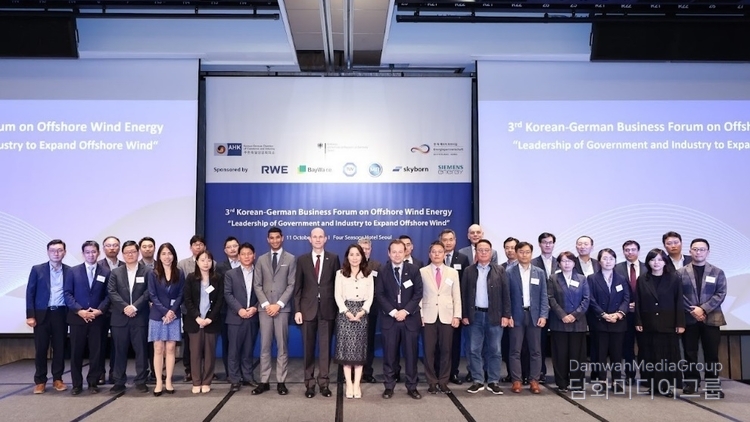By Diplomacy Journal Lee Kap-soo
The Korean-German Chamber of Commerce and Industry (KGCCI, President & CEO Martin Henkelmann), in cooperation with German Embassy Seoul and the Korean-German Energy Partnership, supported by RWE, BayWa r.e., TÜV SÜD, MR, Skyborn Renewables, and Siemens Energy, held the 2024 Korean-German Business Forum on Offshore Wind Energy on October 11 at Four Seasons Hotel, Seoul, South Korea.
The forum aims to strengthen business interactions and partnerships between Korea and Germany in the offshore wind energy industry, as a critical factor in shaping the future of sustainable energy.

Under the theme of “Leadership of Government and Industry to Expand Offshore Wind,” the event attracted more than 160 key officials, industry leaders, and stakeholders from Korean-German energy sector. Notable speakers included Dr. Martin Henkelmann, President & CEO of KGCCI, H.E. Georg Schmidt, Ambassador of German Embassy Seoul, Kyungrok Jung, Director General for Renewable Energy Policy Bureau at the Korea’s Ministry of Trade, Industry and Energy (MOTIE), and Dr. Christian Forwick, Director General for External Economic Policy at the German Federal Ministry for Economic Affairs and Climate Action (BMWK).
Kyungrok Jung, in his congratulatory remark, emphasized the importance of offshore wind energy and Korean-German cooperation in its expansion. “Offshore wind is an important energy source to tackle the climate crisis. I hope that cooperation between two countries in expanding renewable energy including offshore wind will be further strengthened through today’s conference, thereby contributing to the implementation of carbon neutrality.”
Dr. Christian Forwick, in his video congratulatory remark, emphasized “Reducing dependence on fossil fuel in response to climate crisis is very urgent. Given the recent successful offshore wind auctions and expansion goals in Germany, the role of offshore wind energy to achieve net-zero emissions by 2045 is remarkably important, as well as potential for Korean-German cooperation.”
The forum was divided into two sessions: △Challenges and Opportunities of Centralized Government-led Offshore Wind Strategies △What Benefits can Offshore Wind bring to Korea?, followed by Pitching & Fishbowl How can grid infrastructure contribute to achieving Korea’s offshore wind targets? Panelists from MOITE, BMWK, Solutions for Our Climate, Deutsche Bank, RWE Renewables Korea, Incheon Metropolitan City, Korea Institute of Energy Technology (KENTECH), Baywa r.e. Korea, Skyborn Renewables Korea, TÜV SÜD Korea, Korea Energy Economics Institute (KEEI), Taihan Cable & Solution, RWE Supply & Trading GmbH, Youngin Energy Solutions, National Assembly Futures Institute, Siemens Energy, Graduate School of International Studies at Seoul National University, and Korea Electric Power Corporation shared their expertise.
David Jones, Country Manager of Korea and Head of Offshore Development at RWE Renewables Korea provided insights into the role of government policy in fostering the growth of offshore wind energy.
“The Korean government should create strong incentives for green investments to drive market participation and the transition to a sustainable economy. Passing the Special Bill on Offshore Wind in the National Assembly would unlock the full potential of Korea's offshore wind market, accelerating decarbonization and enhancing export competitiveness,” Jones stated. He added, “Offshore wind holds great promise as a clean energy source to combat climate change and support a sustainable future.”
Jihee Jeong, Chair of the Secretariat of Korean-German Energy Partnership in Korea, remarked, “Germany, like Korea, initially had a system where private companies selected sites and promoted offshore wind projects. However, in 2017, this changed to a centralized government-led approach.” She further noted, “With these experiences, I am confident that the German government is able to share valuable insights and experiences relevant to Korea during today’s forum. KGCCI is eager to support further exchanges between two countries in this transition.”

